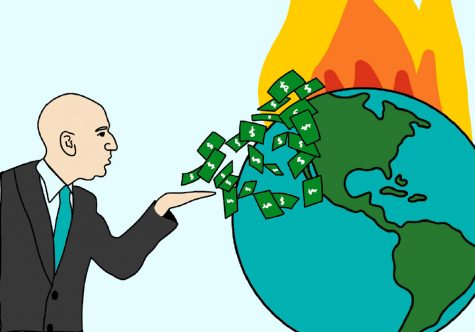Bezos pledges to donate 8% of wealth
Amazon CEO announces grant program fighting climate change
March 4, 2020

As the world faces an ultimatum concerning global warming, Amazon CEO Jeff Bezos has pledged to donate $10 billion towards efforts fighting climate change.
After increasing backlash for Amazon’s environmental practices and his own lacking philanthropy, climate groups like Greenpeace are grateful for Bezos’s grant but are also calling him out on the hypocrisy of this donation.
Bezos announced on Instagram a $10 billion planned donation that has been titled the Bezos Earth Fund. Though many important details have yet to be divulged, what is known so far is that his plan is to donate $10 billion to climate change starting in the summer of 2020.
Bezos’ post states that this donation will be focused on giving grants to scientists, non-governmental organizations and activist groups. This is the largest single donation that has ever been made to climate change, which is unsurprising given Bezos’s astounding $121 billion net worth.
As the richest man alive, even this $10 billion donation represents just under 8% of Bezos’s wealth.
Billionaire philanthropy has been on a major rise throughout the last few decades of United States history. As the wealth gap continues to rise, it is important to examine the impacts of billionaire philanthropy, which in many cases includes massive legal workarounds to either make more money for the donator or cut them a massive tax break.
According to Business Insider, the individual tax rate paid by American billionaires in 2018 was below that of the American working class at 23% to 28% respectively, and philanthropy reduces that tax rate further for individuals.
Some are finding it hard to trust that Bezos has only the planet’s best intentions in mind. Bezos has received backlash for his noticeable lack of philanthropic activities when compared to fellow billionaires like Bill Gates, and Amazon has a bad track record when it comes to environmental impact.
In 2018, the company emitted over 44 million metric tons of carbon. This amount is on par with a small country, as Switzerland emitted 39 million tons, while Denmark produced a further 35.7 million metric tons in the same year.
Additionally, climate activist group Amazon Employees for Justice are underwhelmed with the donation. Amazon has strict external communication policies and the company has threatened to fire the activist group for their public protests against Amazon’s climate-related policies and impact. The group, along with Greenpeace, believe that the best way for Bezos to help climate change is to focus on Amazon’s environmental impact and sticking to its promise of being carbon-neutral within the next decade.
As long as Jeff Bezos is alive, and is donating this money personally, the limits to where his money can go are sparse.
Amazon made no definitive response when asked if this would be part of a donor-advised fund, or Bezos Expeditions, the company which manages Bezos’ personal venture capital investments. The legal structure of the Bezos Earth Fund will have a massive impact on the amount of disclosure that will be required concerning spending, as well as the tax-deduction that Bezos will receive.
Climate scientists have announced that by 2030, greenhouse gas emissions need to be cut by 45%, else many of the worst effects of climate change will be realized.
So, what can Bezos’ money actually do?
Aside from the obvious option of donating the money to already-existing climate activism groups, there are a few different approaches that Bezos could take.
Many believe that the best thing for Bezos to focus on with this money is the development of new technologies in sustainable energy production. Another suggestion made by quite a few climate lobbyist groups has been that Bezos use the money to fund campaigns for climate change-aware candidates who can make a more lasting impact in the legal sphere than individuals or not-for-profit charity groups.
Though 10 billion dollars seems like a lot, it is not enough. It is, in fact, the same amount of money spent on oil every two days by the United States, which can put into perspective the amount of money being funneled into CO2 production.
Not only have climate scientists estimated a need of trillions of dollars to fund sufficient climate adaptation measures and research, private billionaires alone are not going to be able to solve this problem — a problem that they have largely contributed to.
The world needs its governments to step up and provide real, lasting legal and structural changes if we are going to beat climate change, not reliance on billionaires in the private sphere to save us.

























































































